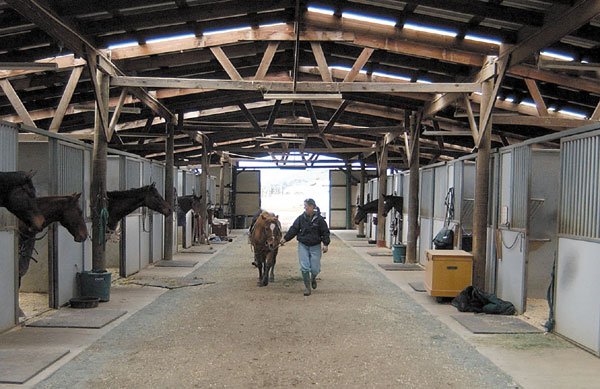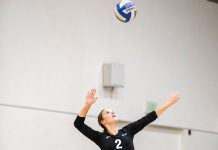Golden Hills Pony Club members practice hard, play hard and
learn valuable life lesson in the process of taking care of their
horses.
A thunder of childlike footfalls fills the corridor. The rider weaves rapidly in and out among the candy striped poles. “Right! Now left! Okay, jump off your pony, hold your pony,” the voice from the sidelines urges. The rider struggles to comply.
Reliving the trials of a Pony Express rider that dropped a piece of mail is tough work. It’s a matter of having more items to hold than hands to hold them. At last the rider succeeds in holding the sack, the retrieved mail, and the reins, remounts and gallops off to pass the sack to the next rider. Another brown stick pony breaks from the starting line, purple beaded bridle flying, and so the game continues.
It’s a cloudy Sunday afternoon and all the madness of a British steeplechase has descended on Woodmyst Farms in Gilroy in a wild array of hula hoops, striped poles, stick ponies, swords, and mugs as members of the Golden Hills Pony Club gather to practice.
Normally club members would be astride their horses, but today there aren’t enough kids present to meet rider quota – so stick ponies it is. But that doesn’t slow the Pony Clubbers down for a second. The kids await their turn to run the gauntlet with equal parts concentration and enthusiasm.
Pony Club began in England in 1928 and has since spread worldwide; the club has recently conquered South County and by all accounts is a rousing success. Everyone seems to strongly agree on one point: Pony Club is about much more than just riding.
“Pony Club is a great, great thing, it builds character,” said Susan Crenshaw, owner of Ligara Farms where many Pony Clubbers train their horses.
“It’s really wonderful, they learn life lessons; it’s not just fun and games,” added Pony Club parent Denise Butler.
Pony Club combines vigorous riding training with intensive horsemanship, transforming children who might be too afraid to even mount a horse into potential Olympians.
Riders progress through a rating system that denotes their riding skills and ability to care for their horse. The rating system is invaluable to trainers like Juliet Clarke, herself an ex-Pony Clubber from Ireland who was “kicked out at 21.”
“Because of the Pony Clubber ratings I know what they know and I can say, ‘OK you can ride this horse and this horse’ whereas with someone who says ‘I’ve been riding five years’ I have no idea what they know,” said Clarke.
For example, Clarke knows that 10-year-old Madison Bagley is a D-1, so she knows that Bagley knows how to walk, trot and turn. “If they’re a D-2 then they can walk, trot and canter and it goes all the way up to A,” explained Clarke. Bagley just earned her D-1 certification and so now she’s enjoying learning how to canter even though “it’s bumpy.”
The classification system may allow individuals to advance on their own initiative but teamwork is at the heart of what Pony Club is all about.
“It’s not about the individual, everything is done as a team, there are no individual sports and the kids know, they’ll tell you ‘there’s no ‘I’ in team,’ ” said Liz Stapleton, the club’s Regional Secretary.
The teamwork ethic permeates even the most mundane every-day practice sessions. Sisters Shelby and Savanna Sanders tag team to get ready for lessons.
“If we have lessons my sister gets the pony and I get the tack, she picks the feet and I groom and then we ride and come back and I pick the feet and she grooms,” said Shelby.
It’s not parental teamwork that counts either, not unless you want your child’s team to be docked; parents can’t give instructions from the sidelines or even come in the barn on game day: it’s all up to the kids.
Rather than be dismayed by the responsibilities placed on them, the kids rise to the challenge.
“They’re excited to be entrusted with that responsibility, it … makes them want to be more responsible,” said Pony Club parent Anne SeCoy.
A lot of parents let their kids stand on their own two feet with regards to the financial aspect of the sport as well.
“It’s an expensive sport,” said Crenshaw, “They need to have an appreciation for the cost.”
Many a Pony Clubber’s story begins with tales of mucking out stalls to earn the horse or the equipment that their parents wouldn’t buy but she couldn’t live without. Kristy Stapleton, one of the club’s older riders, wanted a pair of $925 riding boots and she earned them herself, one horse and stall at a time. Parents agree: ‘work for yourself’ is definitely part of the Pony Club ethic.
Pony Club further undercuts the uppity, spoiled image of daddy’s darling riding a horse that she knows nothing about, didn’t pay for, and doesn’t take care of by making young riders take ownership of the care of their horse. “It’s a rule, they have to know how to take care of their horse, check for injury, groom, medicate,” said Renee Sanders, the club’s District Commisioner.
Being responsible for the health and hygiene of a 1,000 pound animal is a weighty task. The horse’s feet must to be picked to remove rocks and dirt that could cause infection and the dirt and mud must be groomed from the coat.
There’s a specific technique and a circular motion to the grooming process: “I start with the neck and work down,” said Pony Club rider Anne Walker gesturing down her horse Tedd’s neck and across his flanks. “And then I use a different brush on the legs.” Repeat that process seven times in a week, multiply by two if the horse is ridden, plus feeding, exercise, cleaning the tack, and mucking out the stall and you get some idea of the work involved in taking care of a horse.
“It takes a lot of work to keep a horse healthy and conditioned,” Crenshaw said emphatically.
Despite the day-to-day grind, Pony Clubbers seem to bear up under the burden quite cheerfully. Most members practice a minimum of one day a week and attend the club meeting the second Sunday of the month but for older riders like Walker it is not unusual to come out to the stables almost every afternoon. What could provoke such tireless dedication? It could only be love.
Everyone involved, from the trainers to the kids, has a story about how some horse stole their heart and changed their life: it’s the common bond that makes the club tick.
Crenshaw remembers the “big white plowhorse” in her relatives’ field that turned her world into “hearts, flowers, and music.” Today she owns a large training stable in Morgan Hill that many Pony Clubbers utilize .
Fifteen-year-old Walker remembers reading “The Black Stallion” to one of her dolls. Today she has just purchased her first horse, “Tedd,” a chestnut whom she describes as “quick in the saddle and gentle on the ground.”
Ten-year-old Brent Butler just found his niche in riding horses.
“It’s really relaxing,” he said. “You’re sitting on your horse’s back and walking.” Butler joined Pony Club two years ago and now he dreams of some day owning his own Knabstrup. “A Knabstrup looks like a Dalmatian except it’s a horse,” he explained enthusiastically.”
While not every Pony Club parent shares their children’s love of horses, they tend to see the benefits and get out of the way.
“No one else understands (my love of horses) in my family,” Walker admitted.
Even though it may not be real to them personally, Walker’s parents understand her enough to support their daughter’s love of horses, even when it comes at a cost. Pony Club requires parents willing to make sacrifices of time and energy but the positive impact of the club on the kids is so real that most parents consider it well worth the effort.
“I can’t think of any place I would rather have my 15-year-old than in a barn. I much prefer her spending her evenings here than in a mall,” said Stapleton.
“(The kids) are so kind, gentle, supportive, and frankly quite loving with one another. When I see that, all the checks I’ve written, all the blood, sweat and tears I’ve put into Pony Club are worth it,” added SeCoy. “Everything I could want as a parent is happening right in front of my eyes.”
Become a Pony Club Rider
– Expense: Pony Club membership is $205 per year in addition to other expenses. It is not necessary for riders to own their own horse but they must have access to one.
– Ages: Riders can be a part of Pony Club from ages 5 to 21.
– Contact: Renee Sanders District Commisioner 776-0111 or visit the club’s website www.goldenhills.ponyclub.org.














